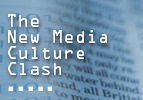



From personal experience, I understand the frustration that can arise attempting to compose scholarly work in a less familiar or less frequently utilized medium. I suspect that these frustrations, the lack of conventions regarding the new media composition process, and the inherent uncertainties about how such a work will be evaluated predispose graduate students to avoid composing new-media-based scholarship. Based on personal experience and informal discussions with peers, I know that fluency in those new media or the use of digital composition tools does not guarantee that a graduate student will avail himself or herself of the option to compose something other than the traditional paper-based argument. Further, I have found little thus far that examines how graduate students decide whether or not to engage in the new media composition process.
Given this perceived gap, I will examine the following research questions:
Introduction • Essential questions • General benefits • Specific benefits • Important notes • Works cited • Home